Prisons are housing mental health patients who’ve committed no crimes
By: Julianne Hill
January 2019
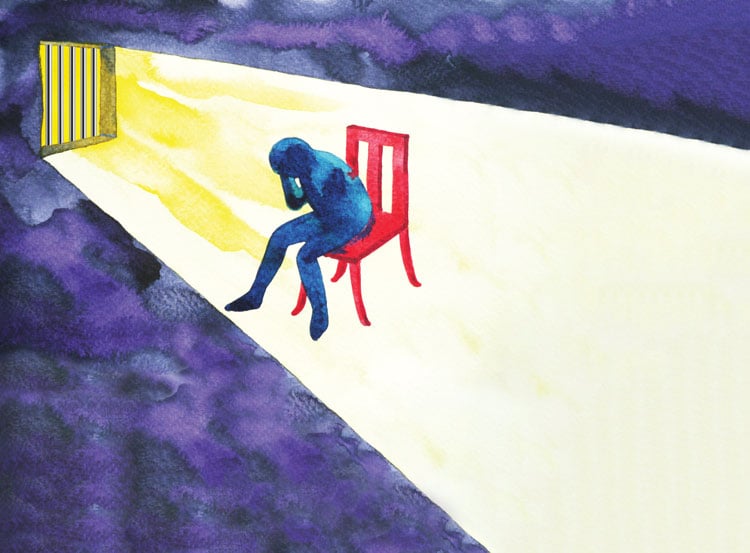
Photo by Benjavisa/Getty Images
Andrew Butler was a popular kid at Hollis Brookline High School in New Hampshire, an honors student who was captain of the football and wrestling teams.
Then, during college, Andrew tore his leg muscles, making even walking to class difficult. He started struggling with depression, and after talking with his dad, he decided to take time off from his chemical engineering studies at Worcester Polytechnic Institute in Massachusetts.
One weekend in July 2017, Andrew went camping in Vermont with friends. When he came back, he was acting strangely, running around in the woods, punching trees, clearly acting out on hallucinations that started after experimenting for the first time with psilocybin, the active compound found in hallucinogenic mushrooms.
Over the next few months, Andrew’s condition continued to spiral downward, which worried his father, who worked as a mechanical engineer. The single father took his only child to therapy and a psychiatrist, but Andrew’s behavior only worsened.
By October, his father needed to bring him to New Hampshire Hospital in Concord, the state’s only hospital for mental health patients. Andrew was diagnosed with schizophrenia, hospitalized for several months and given psychotropic medications.
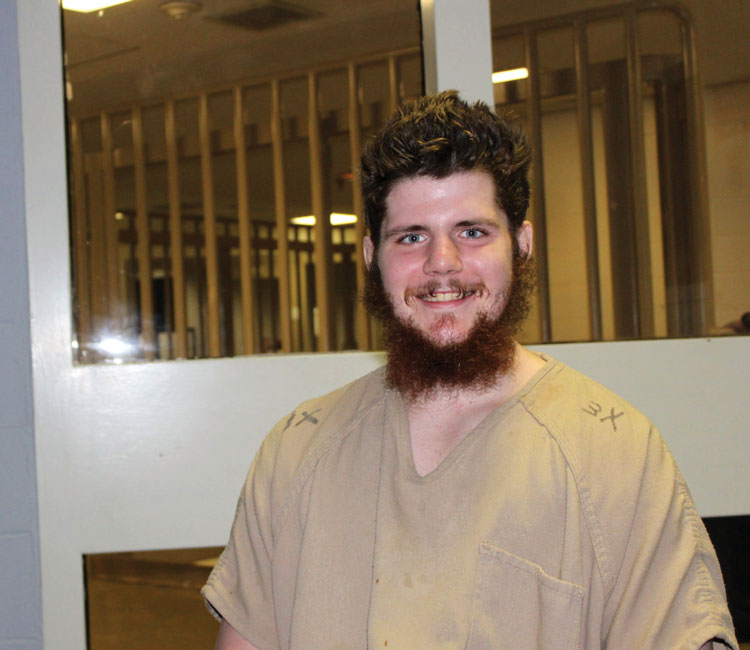
Andrew Butler at the Secure Psychiatric Unit in the New Hampshire State Prison for Men in Concord. Photo by Nancy West, InDepthNH.org
But Andrew continued to change, and in January he tried to punch his father during a visit. “I could look in his eyes and could tell that he was not really there,” Doug Butler says.
Others in the hospital saw the attempted hit, and Andrew was labeled a danger to himself and others. He was transferred to the 60-bed secure psychiatric unit of the New Hampshire State Prison for Men, known as the SPU, the only facility in the state available to handle patients needing higher-level care. He and his father were told it would be temporary. “It felt out of my control,” Doug Butler says. “I was his guardian then, but they would not let me see him until I signed papers to send him there. On the papers, though, it didn’t say just two weeks. There was no time limit stated.”
There, Andrew was issued the same kind of jumpsuit as a convicted criminal and was assigned an inmate number. Andrew, then 21 years old, was held with pretrial detainees, those not competent to stand trial and those found not guilty by reason of insanity.
“When you move someone from the hospital to the SPU, you are transferring them from the Department of Health and Human Services to the Department of Corrections,” says New Hampshire State Rep. Robert Renny Cushing, a Democrat who sits on the state’s Criminal Justice and Public Safety Committee. “That is the moment you criminalize someone with mental illness who has done nothing wrong.”
Frankie Berger, director of advocacy at the nonprofit Treatment Advocacy Center in Arlington, Virginia, says it’s clear that New Hampshire doesn’t want to cover the cost of securing a part of its state hospital. “That’s what this comes down to—money,” Berger says.
PRISON CELL TREATMENT

Frankie Berger. Photo by Nancy West, InDepthNH.org
At the SPU, Andrew was given Depakote, typically used for bipolar disorder. He was not allowed to take certain other medications because of their high street value, which could lead to theft by inmates within the prison walls. He was held in solitary confinement for 23 hours per day, guarded by corrections officers. Group therapy was held in 4- by 10-foot metal cages. His father’s guardianship was taken away.
Although its beds are used for mental health patients, the SPU is not an accredited mental health facility. Although he was being held in a maximum-security prison, Andrew was never charged with a crime. Although Andrew was told the transfer was temporary, his father says he was told Andrew might stay in the prison the rest of his life.
“It was four months later that they said he could be there for the rest of his life. I was outraged, sure,” Doug Butler says. “Everything was done under duress, and they took advantage of it, and they kept him in the goddamned prison.”
Andrew Butler’s case went to U.S. District Court in Concord where his lawyer requested he be transferred out of prison to a psychiatric facility. It is one of the latest cases in a long-standing but quiet battle in New Hampshire centered on using state prison beds for mental health patients in crisis who have not been charged with any crimes.
Other states use local jail cells for mental health holds; however, New Hampshire stands alone in its legal treatment of mental health patients within state prison walls.
In either case, those with mental health problems are being held in facilities normally reserved for criminal defendants and convicted criminals when no other facility is ready or willing to take them. And in both cases, some say these practices fly in the face of the U.S. Constitution.
“What is happening in New Hampshire is at the top of the list of unacceptable things I’ve seen in my work—and I’ve seen a lot,” the Treatment Advocacy Center’s Berger says. “When you tell people that this is happening and it is real, you’re met with bafflement and disbelief. And it is so much worse than it appears at first blush. It’s baffling, just baffling.”
Advocates around the country are calling for the end of using all levels of correctional facility beds for mental health treatment. Recently, Colorado overhauled its system, ending the practice of putting patients in jails by building up support systems around the state. But in New Hampshire, only a few of the state’s 424 legislators are taking on the issue, making it an uphill battle.
CIVIL RIGHTS VIOLATIONS
To extract Andrew from the prison’s psychiatric unit, his father contacted Sandra Bloomenthal, a Nashua, New Hampshire, attorney. In April, she filed a petition in the U.S. District Court for a writ of habeas corpus against the state for unconstitutionally imprisoning Andrew—a civilly committed patient in need of psychiatric care—in the men’s prison. The petition called for Andrew’s immediate release because of civil rights violations.
“[He is] denied contact visits with his father … denied contact visits with his attorney,” Bloomenthal wrote in the petition. “He has been tasered. The treatment he has received is cruel and unusual punishment without having been convicted of a crime and with no pending criminal process.”
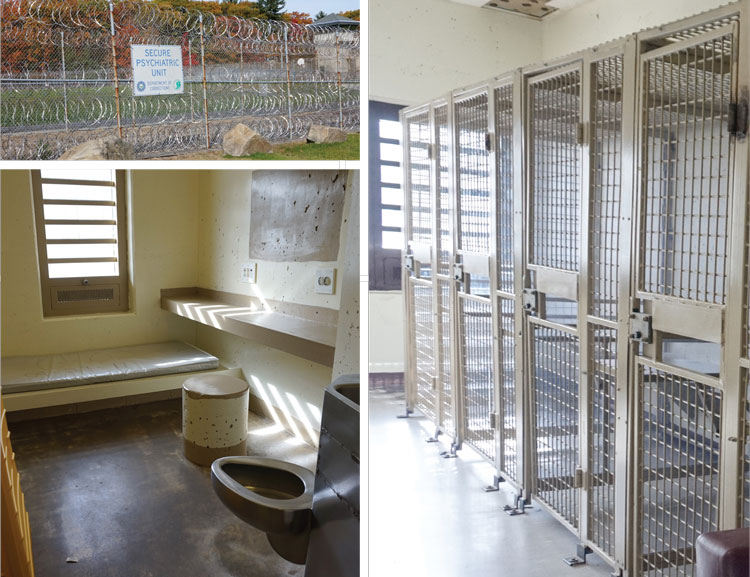
The Secure Psychiatric Unit of the State Prison for Men in Concord, New Hampshire: Top left shows the prison fencing outside the unit. Below left is a typical cell at the SPU. At right are metal booths where some mentally ill patients receive group therapy. Photos by Nancy West, InDepthNH.org
In a later statement to the court, she wrote, “Andrew Butler is stripped of his basic fundamental constitutional rights by his incarceration. His present need for secure psychiatric care is not at issue. At issue is Andrew Butler’s cruel treatment and false imprisonment in a nonaccredited and nonlicensed facility, which is prison and not a hospital.”
The suit caught the attention of local activists, who held rallies and marches for Andrew’s release. “These patients are having a prisoner experience, not a recovery experience,” says activist Beatrice Coulter, a registered nurse who worked at the SPU for five days before quitting and who is co-founder of Advocates for Ethical Mental Health Treatment. “There is a terrible blurring of the mental health world and the corrections world. It’s an awful hybrid of treatment that the state is passing off as legal.”
NATIONWIDE FALLOUT
States from New Hampshire to Colorado to Texas are dealing with the long-lasting and wide-ranging fallout from the 1980s-era moves to end the practice of warehousing people with mental illness in large state hospitals, known as deinstitutionalization. The goal of taking away federal support from these institutions was to create new smaller community centers to provide support. However, most of those centers have never materialized, forcing many people with mental illness to live without psychiatric care.
Since deinstitutionalization, the number of psychiatric beds has continued to fall. In 2016, an estimated 10.4 million American adults lived with a serious mental illness, according to the National Institute of Mental Health. That same year, the number of state and county psychiatric beds hit 37,769, down from its peak of 559,000 beds in 1955, according to the Treatment Advocacy Center. That means emergency rooms are backed up with patients waiting for psychiatric beds that stay full because there is no community program to support the patients when they are discharged.
“What we’ve done is made our jails and prisons the new mental health institutions,” says Moe Keller, director of advocacy at Mental Health Colorado and a former Colorado state legislator. “This is the 21st century in the United States of America. And this is the best we can do?”
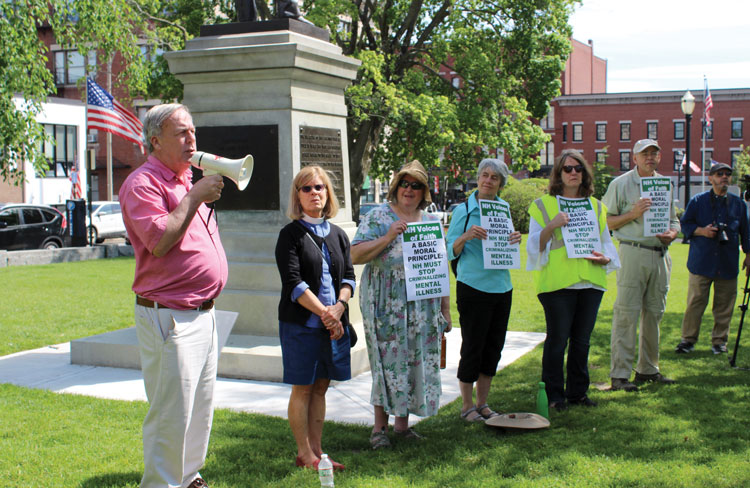
New Hampshire state Rep. Renny Cushing speaks into the bullhorn with marchers demanding Andrew Butler be transferred to a psychiatric hospital. Photo by Nancy West, InDepthNH.org
LACK OF RESOURCES
“It’s something we’re seeing in state after state,” says John Snook, executive director of the Treatment Advocacy Center. “People are grasping for a solution, trying to figure out how to make the best of a terrible situation. It’s discrimination.”
New Mexico, North Dakota, South Dakota, Texas and Wyoming legally use county jail beds temporarily for mental health holds. Sometimes, those in a mental health crisis—typically those who have suicidal ideation—are handcuffed and transported in the back of a squad car and receive no medical attention while held in a cell.
In rural states, stretched county law enforcement resources, coupled with the lack of psychiatric hospital beds and community-based mental health services, leave few options for those needing immediate care. Small towns are often located hundreds of miles away from mental health hospitals, and transporting people in mental health crisis becomes the biggest issue.
“On the outlying jurisdiction eastern plains of Colorado, psychiatric resources are nonexistent,” says Gina Shimeall, a criminal defense lawyer who also volunteers with the National Alliance on Mental Illness in Castle Rock, Colorado.
Law enforcement officers sometimes must drive two or three hours each way to the nearest hospital with mental health units, tying up those officers for an entire day. “Communities didn’t put these transportation times and costs in the budget,” the TAC’s Snook says. “We found Oklahoma law enforcement officers drove 1 million miles in one year just to transport people to mental health facilities. And sometimes, the hospital can’t even take them in once they arrive.”
Jenny Hill, program coordinator for the city and county of Denver’s Office of Behavioral Health Strategies, says if she lived in a rural area and had a stroke, she’d immediately get emergency medical care. “But if I’m experiencing psychosis, you can put me in a jail and hold me there,” she says.
LIVE FREE, OR DIE?

Photo of Gina Shimeall courtesy of Gina Shimeall.
New Hampshire, where Andrew Butler was held in the state prison’s secure psychiatric unit, also faces a shortage of beds. An estimated 36,000 people in the state live with serious mental illnesses, according to the Treatment Advocacy Center. But in 2016, there were only 158 state hospital beds for psychiatric treatment. That means inpatient treatment during a psychiatric crisis has become nearly impossible. As a result, at any given time, 10 to 12 civilly committed people with mental illness are held in the SPU, according to testimony given in 2010 to a New Hampshire House of Representatives committee studying the issue. Some stay a few months; others stay years.
Advocates point to the cost savings of holding a patient in the prison. In New Hampshire, keeping a mental health patient in the SPU costs $307.21 per day, according to the Department of Corrections, while a stay in the state hospital psychiatric unit costs $1,413 per day, according to the state Department of Health and Human Services.
“This includes locking mentally ill women in the men’s prison. Also, patients with developmental disabilities are locked away in the prison as well. The civilly committed are exposed to criminally convicted inmates,” Butler’s attorney Bloomenthal wrote in response to the state’s argument that the court should dismiss the petition.
The SPU does have clinical staff, says Paula Mattis, director of medical and forensic services at the Department of Corrections, which oversees the prison’s SPU. Staff includes one full-time psychiatrist, two psychiatric nurse practitioners, eight nurses, three social workers, one mental health counselor and one recreational therapist.
HISTORICAL JUSTIFICATION

Photo of Paula Mattis by Heidi Guinen
Before deinstitutionalization, New Hampshire ran a sprawling mental institution.
“There, those involved with the criminal justice system were held along with mental health patients,” Cushing says. “So, in a sense, it was exactly like what is happening in the prison now, with both populations in one place. But the big difference is they were in a hospital, a huge institution, and everyone’s mental health care was under direction of Health and Human Services. Everyone was clear that this place was all about treating health issues.”
As the federal government pulled support for larger mental institutions, the facility closed, and those mental health patients moved to the state hospital. Those who had been involved in the criminal justice system were moved to the SPU.
Soon afterward, as promises of building a secure psychiatric wing for the New Hampshire hospital were made, the most severely ill patients—who had not committed crimes—were “temporarily” moved to the prison as well, an arrangement that continues today.
The state has several statutes that allow this practice. “The state law is not in alignment with the U.S. Constitution, yet that’s what they’re operating under,” the Treatment Advocacy Center’s Berger says. “The state will have to have a fire lit under them—like get sued—to make these tough budget decisions.”
“There is a culture of complacency that has been created here in New Hampshire,” says advocate Coulter. “After 30 years, it has been given legitimacy.”
NEW PUSHES
For years, attempts to fund a new high-security psychiatric facility at the New Hampshire Hospital grounds—estimated in 2010 to cost about $13 million—have failed. Many of those attempts were launched by Cushing. However, in recent years, Cushing has pushed in new directions. In 2016, he joined the TAC and the American Friends Service Committee to file a complaint with the Department of Justice. “The state of New Hampshire is systematically and intentionally violating the Constitution, as well as the civil rights and civil liberties of a very vulnerable population of its citizenry,” the letter states.

Jenny Hill: “In my mind, I was protecting myself from further harm.” Photo courtesy of Jenny Hill.
After receiving no response, in May of 2018, he filed a Freedom of Information Act request for information about the 2016 complaint. In November, he received a notice from the DOJ denying the request, stating that “The records you have requested pertain to an ongoing law enforcement proceeding. After consideration of the responsive records, I have determined that access to the documents should be denied … since disclosure thereof could reasonably be expected to interfere with law enforcement proceedings.”
Cushing responded to the denial in an email to constituents. “Given the totality of what has happened, I don’t believe any reasonable person could possibly conclude anything I do could in any way be construed as interfering with enforcing the laws concerning the rights of people being held in the Secure Psychiatric Unit.”
In addition, this year, Cushing sponsored House Bill 1565, requiring the Department of Corrections to apply to the Joint Commission on Accreditation of Hospitals to accredit the SPU as a psychiatric hospital. Though it passed New Hampshire’s House, the Senate amended the bill, downgrading the accreditation to a behavioral health facility. The DOC was required to file an interim report on the feasibility of accreditation by Jan. 1.
The first step will be reaching out to the National Commission on Correctional Health Care, which can determine what is necessary for accreditation, the DOC’s Mattis says. If the costs of updating the facility to meet standards exceeds its budget, the DOC can request that amount in its budget to be in compliance, she adds. Mattis is confident that they already meet the standards for medical care. Colorado jail hold
In my mind, I was protecting myself from further harm.—Jenny Hill
Jenny Hill, from Denver’s Office of Behavioral Health Strategies, recalls a night in 2010 when she had a breakdown. A survivor of childhood physical and sexual abuse, the then-46-year-old, who lives in recovery from post-traumatic stress disorder with dissociation and trauma-induced psychosis, went to her ex-husband’s home in Colorado to discuss the financial settlement of their divorce. When he closed the door on her, Hill says, her anxiety heightened. She remembers hearing voices in her head, causing suicidal ideation.
Her ex-husband called the police. When officers arrived at the home in Aurora, Colorado, they handcuffed Hill, put her into the back of a cruiser and brought her to the municipal jail, says Hill, who testified before the Colorado Senate Judiciary Committee in 2017 about this experience.
Being handcuffed terrified Hill. The arrest amplified her anxiety, exacerbating her condition and preventing her from focusing on what officers were saying. She wanted to lie down, but that wasn’t possible in a patrol car. In the cold jail cell, she begged for a blanket for comfort. She was told she would be charged with a felony and could face prison time.
The jail offered no psychiatric treatments and no protection from others. During her 36 hours in the jail, Hill says she was injured by correctional officers after she panicked and became defensive when they approached her. “In my mind, I was protecting myself from further harm,” she says.
One officer understood her condition. “I believe a supervisor who wore a Crisis Intervention Team pin [indicating he had training in handling a mental health crisis] brought me a blanket and took time to talk with me,” she adds. “He helped me understand what was going on, and he helped me calm down.” No charges were filed against Hill.
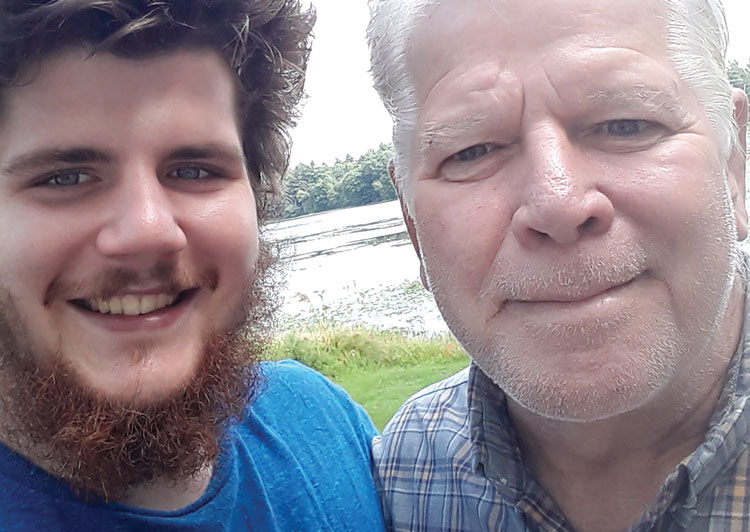
Andrew Butler and his father, Doug Butler. Photo by Nancy West, InDepthNH.org
MAKING A ‘TERRIBLE CHOICE’
In 2016, the Colorado Hospital Association and the County Sheriffs of Colorado brought the 30-year practice of mental health holds—most often for people who were suicidal like Hill—to the attention of the state legislature. People having a mental health crisis in Colorado could be put on an “M-1 hold,” to have evaluators determine whether the individual’s behavior was so risky that they needed to be hospitalized against their will.
But without enough psychiatric hospital beds in the plains of Colo- rado, law enforcement could bring a person on an M-1 hold to a local jail for 24 hours while the sheriff’s officers called around the state for an available bed, even if the individual had not been charged with a crime.
“The sheriffs often had to make a terrible choice if the person was suicidal and in jail,” Mental Health Colorado’s Keller says. “When the 24 hours were up, they had to decide: Do we hang on to the person, breaking the law, or do we let that person go, knowing they will complete the suicide?”
“The response from a criminal justice point of view is logical: ‘We know they are safer in our facility than leaving without treatment or a place to go.’ But that’s such a twisted view,” the TAC’s Berger says.
Chris Johnson, executive director of the County Sheriffs of Colorado, says the state is at least 2,500 beds short of what is needed for mental health patients. “This means a lot of people were overstaying the legal hold,” Johnson says. “This is a Fourth Amendment violation issue. And the sheriffs want to obey the Constitution of the United States.”
His group lobbied legislators, and in 2016, Senate Bill 16-169, which would have extended the time a person in a mental health crisis could be held from 24 to 48 hours, passed both houses.
After lobbying by advocacy organizations such as Colorado Mental Wellness Network, Colorado’s Democratic Gov. John Hickenlooper vetoed the bill. “We agree that appropriate mental health facilities are not always readily available to treat persons having a mental health crisis. While well-intentioned, we are concerned that SB 16-169 does not provide adequate due process for individuals,” Hickenlooper said in a statement.
“When the Colorado legislature made that choice to put forth that bill and the governor vetoed it, that shined a bright light on this problem. It hit the media and made it so clear to other states doing this practice,” the TAC’s Berger says.
TASK FORCE NEGOTIATIONS
Along with the veto, Gov. Hickenlooper directed the Colorado Department of Human Services to create a mediated task force that included stakeholders ranging from medical professionals to law enforcement to public defenders to people who have lived with mental health issues.
Colorado had already intensified focus on behavioral health after the 2012 Aurora theater shooting, where gunman James Holmes killed 12 people and injured at least 70. At that time, the governor signed legislation creating a health crisis response system that included 24/7 walk-in crisis centers around the state that would treat people regardless of their ability to pay and allocated funding for a hotline and mobile vans.
Despite the task force’s directive from the governor to “recommend public policy changes to ensure proper mental health treatment and protection of federal and state constitutional rights for Coloradans experiencing mental health crises,” the negotiations were the “hardest negotiations ever,” Mental Health Colorado’s Keller says.
The most difficult part, says Doug Wilson, a Colorado state public defender on the task force, is that there is no data-sharing between the state’s different county jails. “In fact, there is no data on how many people had been held [on mental health holds]. The sheriffs said, ‘We don’t keep the data because they weren’t charged, and they weren’t booked. There was no system for that.’ ”
After several months of negotia- tions to carefully craft the language of the recommendations, the governor signed Senate Bill 17-207, allocating $7 million collected from the state’s marijuana tax for mental health support.
The resulting bill mandated that all walk-in centers throughout the state are appropriately designated, adequately prepared, and properly staffed to accept an individual in need of an emergency 72-hour mental health hold. In addition, mobile response units are required to be available within 2 hours, either face to face or using telehealth operations for mobile crisis evaluations. And importantly, the bill demands that at no time and for no reason should a person on an emergency mental health hold be detained or housed in a jail or lockup.
While it is too early to tell how these mandates will play out, Colorado’s moves have the attention of advocates. “Colorado is now a good place to watch,” says the TAC’s Berger. “These are big, important issues to tackle if we’re going to have systemic change. Let’s see how it shakes out.”
PUSH TO GO HOME
As winter turned into spring, Andrew’s friends and neighbors continued to protest his placement in the SPU. On May 24, the day of Andrew’s hearing in federal court on his habeas corpus petition to be transferred to a psychiatric hospital, friends and advocates walked 2 miles in protest from the prison to the courthouse. He was not granted a release, but the protest earned media attention.
Then, in June, five months after his temporary hold in the prison mental health unit began, Andrew was returned to New Hampshire Hospital. Two weeks later, Andrew was released to his father’s care on conditional release, mandated by law to take the psychiatric medications the state doctors prescribed.
“Any time they want to, they could latch onto him and throw him back in prison,” Doug Butler says. “They would not have to go to court. He’d be better off and have more rights if he was a criminal.”
Andrew, who has been living at his father’s house, is improving, his dad says. His friends and neighbors are supportive, and family friends have taken him on a vacation to the mountains.
Shortly after Andrew returned home, Doug Butler said he hoped his son would go back to school or find a job, or perhaps do both. Despite the steps forward, Andrew faces a long journey of healing. “He will have a lot of PTSD to deal with the rest of his life from all of his time in the SPU,” his dad says.
Article originally appeared in the ABA Journal’s January issue.


